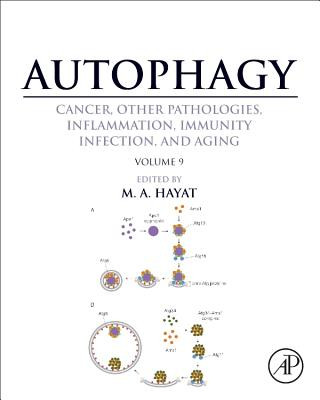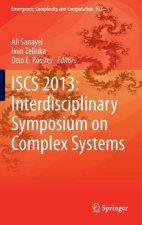
Doručenie
Nákupný poradca





Nehodí sa? Žiadny problém! U nás môžete do 30 dní vrátiť
 Darčekový poukaz
v ľubovoľnej hodnote
Darčekový poukaz
v ľubovoľnej hodnote
S darčekovým poukazom nešliapnete vedľa. Obdarovaný si za darčekový poukaz môže vybrať čokoľvek z našej ponuky.
Autophagy: Cancer, Other Pathologies, Inflammation, Immunity, Infection, and Aging
 Angličtina
Angličtina
 750 b
750 b
30 dní na vrátenie tovaru
Mohlo by vás tiež zaujímať


Understanding the importance and necessity of the role of autophagy in health and disease is vital for the studies of cancer, aging, neurodegeneration, immunology, and infectious diseases. Comprehensive and forward-thinking, these books offer a valuable guide to both cellular processes while inciting researchers to explore their potentially important connections. Volume 9 Necrosis and Inflammation in Human Diseases emphasizes the role of Autophagy in necrosis and inflammation. This volume also explains in detail the molecular mechanism(s) underlying the formation of autophagosomes, including the progression of Omegasomes to autophagosomes. This information is important because one of the major functions of autophagy is to degrade and eliminate excessive, old, and harmful materials from the cell. Autophagosomes receive these materials (cellular cargo) and transports them to lysosomes for degradation. Lysosomes contain the digestive enzymes (hydrolases) that breakdown proteins, lipids, carbohydrates, etc (self-digestion). To further explain this phenomenon, the role of endoplasmic reticulum (ER) in the formation of autophagosomes will be discussed. ULK1 and Beclin 1 proteins are also important in the initial formation of autophagosomes, which are discussed. Because much of the early research in this area was carried out using yeast cells, the role of Golgi complex in the autophagosome formation in these cells is explained. An explanation of the Role of autophagy related gene ATG5 in cancer (e.g., gastrointestinal cancer) is included. Paradoxically, autophagy is a “double -edged sword”, because it can promote tumor growth, and can be used by intracellular pathogens to multiply and cause infection. Another role of autophagy is that it inhibits chemosensitivity and radiosensitivity in cancer. Considering that autophagy is associated with numerous biological processes including cellular development and differentiation, cancer (both antitumor and protumor functions), immunity, infectious diseases, inflammation, maintenance of homeostasis, response to cellular stress, and degenerative diseases such as Alzheimer’s, Parkinson's, Huntington's, amyotrophic lateral sclerosis, and prion diseases, there is a great need to understanding its role. Cell homeostasis is achieved by balancing biosynthesis and cellular turnover. In spite of the increasing importance of autophagy in various pathophysiological situations (conditions) mentioned above, this process remains underestimated and overlooked. As a consequence, its role in the initiation, stability, maintenance, and progression of these and other diseases (e.g., autoimmune disease) remains poorly understood. Volumes in the Series Volume 1: Molecular Mechanisms. Elucidates autophagy’s association with numerous biological processes, including cellular development and differentiation, cancer, immunity, infectious diseases, inflammation, maintenance of homeostasis, response to cellular stress, and degenerative diseases such as Alzheimer’s, Parkinson's, Huntington's, amyotrophic lateral sclerosis, and prion diseases. Volume 2: Role in General Diseases. Describes the various aspects of the complex process of autophagy in a myriad of devastating human diseases, expanding from a discussion of essential autophagic functions into the role of autophagy in proteins, pathogens, immunity, and general diseases. Volume 3: Role in Specific Diseases. Explores the role of autophagy in specific diseases and developments, including: Crohn’s Disease, Gaucher Disease, Huntington’s Disease, HCV infection, osteoarthritis, and liver injury, with a full section devoted to in-depth exploration of autophagy in tumor development and cancer, as well as the relationship between autophagy and apoptosis. Volume 4: Mitophagy. Presents detailed information on the role of mitophagy, the selective autophagy of mitochondria, in health and disease, by delivering an in-depth treatment of the molecular mechanisms involved in mitophagy initiation and execution, as well as the role of mitophagy in Parkinson Disease, cardiac aging, and skeletal muscle atrophy. Volume 5: Role in Human Diseases. Comprehensively describes the role of autophagy in human diseases, delivering coverage of the antitumor and protumor roles of autophagy; the therapeutic inhibition of autophagy in cancer; and the duality of autophagy’s effects in various cardiovascular, metabolic, and neurodegenerative disorders. Volume 6: Regulation of Autophagy and Selective Autophagy. Provides coverage of the mechanisms of regulation of autophagy; intracellular pathogen use of the autophagy mechanism; the role of autophagy in host immunity; and selective autophagy. Volume 7: Role of Autophagy in Therapeutic Applications. Provides coverage of the latest developments in autophagosome biogenesis and regulation; the role of autophagy in protein quality control; the role of autophagy in apoptosis; autophagy in the cardiovascular system; and the relationships between autophagy and lifestyle. Volume 8: Autophagy and Human Diseases. Reviews recent advancements in the molecular mechanisms underlying a large number of genetic and epigenetic diseases and abnormalities, and introduces new, more effective therapeutic strategies, in the development of targeted drugs and programmed cell death, providing information that will aid on preventing detrimental inflammation. Volume 9: Necrosis and Inflammation in Human Diseases. Emphasizes the role of Autophagy in necrosis and inflammation, explaining in detail the molecular mechanism(s) underlying the formation of autophagosomes, including the progression of Omegasomes to autophagosomes. Presents the most advanced information regarding the role of the autophagic system in life and death and whether autophagy acts fundamentally as a cell survivor or cell death pathway or bothIntroduces new, more effective therapeutic strategies, in the development of targeted drugs and programmed cell death, providing information that will aid on preventing detrimental inflammationStates recent advancements in the molecular mechanisms underlying a large number of genetic and epigenetic diseases and abnormalitiesEdited work with chapters authored by leaders in the field around the globe - the broadest, most expert coverage available
Informácie o knihe
 Angličtina
Angličtina




 Ako nakupovať
Ako nakupovať

























